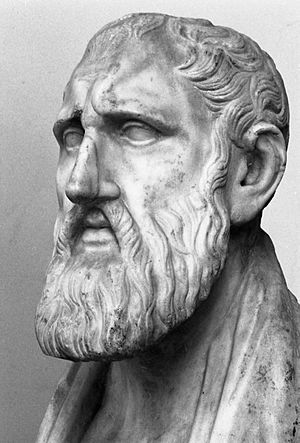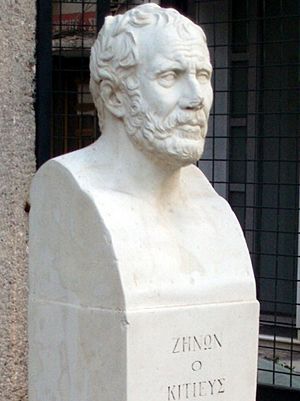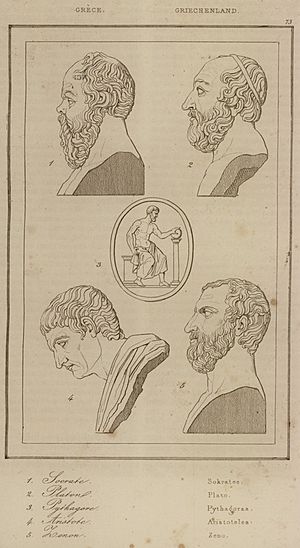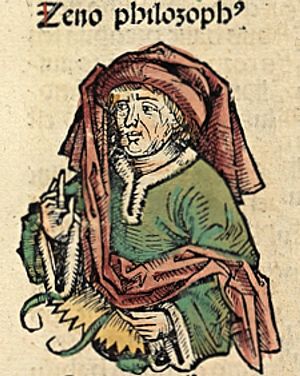Zeno of Citium facts for kids
Quick facts for kids
Zeno of Citium
|
|
|---|---|

Zeno of Citium. Bust in the Farnese collection, Naples. Photo by Paolo Monti, 1969.
|
|
| Born | c. 334 BC |
| Died | c. 262 BC (aged 71–72) |
| Era | Hellenistic philosophy |
| Region | Western philosophy |
| School | Stoicism |
|
Main interests
|
Logic, Physics, Ethics |
|
Notable ideas
|
Founder of Stoicism, three branches of philosophy (physics, ethics, logic), Logos, rationality of human nature, phantasiai, katalepsis, world citizenship |
|
Influences
|
|
|
Influenced
|
|
Zeno of Citium (born around 334 BC, died around 262 BC) was an important Hellenistic thinker. He came from Citium in Cyprus. Zeno is famous for starting the Stoic school of philosophy.
He began teaching in Athens around 300 BC. Stoicism built on the ideas of the Cynics. It focused on living a virtuous life in harmony with nature. This way of thinking aimed for goodness and inner peace. Stoicism became very popular and was a major philosophy from the Hellenistic period through the Roman era. Its ideas are still studied today.
Contents
Zeno's Life Story
Zeno was born in Citium, a city in Cyprus. This city had both Phoenician and Greek people. Historians are not sure if Zeno was Phoenician or Greek. We know he had a Greek name and studied in Greece. There is no proof he spoke any language other than Greek. His father's name was Mnaseas.
Most of what we know about Zeno comes from a book by Diogenes Laërtius. This book is called Lives and Opinions of Eminent Philosophers. It shares many stories and facts about Zeno's life.
How Zeno Became a Philosopher
Zeno started his journey into philosophy after a shipwreck. He was a wealthy merchant, but his ship was lost on a trip from Phoenicia to Peiraeus. After this, he went to Athens.
In Athens, Zeno visited a bookseller. He found a book by Xenophon called Memorabilia. Zeno loved how the book described Socrates. He asked the bookseller where he could find people like Socrates. Just then, Crates of Thebes walked by. Crates was a famous Cynic philosopher. The bookseller pointed to him, and Zeno became Crates' student.
Zeno's Character and Teachers
Zeno was known for being thin and having dark skin. He lived a simple, strict life, even though he was rich. This way of living was influenced by the Cynic teachings.
Crates tried to help Zeno overcome his shyness. One story tells how Crates made Zeno carry a pot of lentil soup through the city. When Zeno tried to hide it, Crates broke the pot. The soup spilled down Zeno's legs. Crates then told him, "Why run away, my little Phoenician? Nothing terrible has happened to you."
Besides Crates, Zeno also studied with other philosophers. These included Stilpo and the dialecticians Diodorus Cronus and Philo. He also learned about Platonist philosophy from Xenocrates and Polemo.
Starting the Stoic School
Zeno began teaching in 301 BC. He taught in a public colonnade in the Agora of Athens. This place was called the Stoa Poikile, which means "Painted Porch."
At first, his students were called "Zenonians." But soon, they became known as "Stoics." This name came from the Stoa Poikile, where they met.
Zeno was respected by many, including King Antigonus II Gonatas of Macedon. The king would visit Zeno whenever he came to Athens. Zeno sent his friend and student Persaeus to visit the king instead of going himself. Other important students of Zeno included Aristo of Chios, Sphaerus, and Cleanthes. Cleanthes took over the Stoic school after Zeno.
Zeno was offered Athenian citizenship but turned it down. He didn't want to seem disloyal to his home city of Citium. He was highly honored there. Zeno was described as serious and quiet. He preferred talking with a few people rather than many. He also liked to dig deep into ideas and disliked long, fancy speeches.
Zeno passed away around 262 BC. The Greeks honored him greatly, even though he was not originally Greek. They compared him to Cadmus, a legendary Phoenician hero who brought the alphabet to the Greeks. Zeno brought Stoicism to them. He was called "the noblest man of his age," and a bronze statue was built in his honor. He also received a golden crown, and a tomb was built for him.
The Zeno crater on the Moon is named after him.
Zeno's Philosophy: How He Saw the World
Zeno divided philosophy into three main parts:
- Logic: This included how we think, speak, and understand things. It covered rhetoric (persuasive speaking), grammar, and how we perceive the world.
- Physics: This wasn't just about science. It also included understanding the divine nature of the universe.
- Ethics: This was the most important part. It was about finding the right way to live to achieve eudaimonia (happiness or a good life). This meant living in agreement with nature.
It's hard to know exactly what Zeno thought about everything. His ideas were later expanded by other Stoics like Chrysippus. But we can understand his main views.
Logic: Understanding Truth
Zeno believed that understanding logic was very important. A wise person needs to know how to avoid being tricked. He said that true ideas could be either "understandable" or "not understandable." He also believed that people have the power to choose what they believe based on their senses.
Physics: The Universe as God
Zeno saw the universe as a living, thinking being, which he called God. He believed that everything in the universe is connected.
He thought that a divine fire or aether (a pure substance) was the source of all activity. This fire acts on matter, which is otherwise passive. The universe goes through cycles of being formed and then destroyed, much like the ideas of Heraclitus. Zeno also believed that the universe is guided by Fate and always does what is right.
Ethics: Living a Good Life
Like the Cynics, Zeno believed there was only one true good: virtue. He said, "Happiness is a good flow of life." This happiness comes from using right reason, which matches the universal reason (Logos) that guides everything.
Zeno believed that bad feelings (pathos) are disturbances of the mind that go against reason and nature. A steady soul, which leads to good actions, is virtue. True good can only be found in virtue.
Zeno differed from the Cynics by saying that some things, even if they are not good or bad in themselves (called adiaphora), can still have value. For example, things that help us survive have a certain value. He called these "fitting actions" (kathêkon). However, these things only have a conditional value. They don't directly lead to happiness, which only comes from moral actions.
Zeno taught that vice (badness) happens when we reject reason. Virtue and vice cannot exist together. All actions are either good or bad. Even emotions that are not guided by reason are seen as wrong and can lead to bad actions. Zeno identified four negative emotions: desire, fear, pleasure, and sorrow. He also pointed out three positive emotions: will, caution, and joy. He believed that all errors must be completely removed and replaced with right reason.
Zeno's Writings
None of Zeno's original writings have survived completely. We only have small parts of them, quoted by later writers.
His most famous work was Zeno's Republic. This book was written either to copy or to argue against Plato's Republic. Even though it's lost, we know more about it than his other works. It described Zeno's idea of a perfect Stoic society.
In 1949, a manuscript thought to be Zeno's On Nature was found in an Old Armenian translation. However, later studies showed that it was written by a Christian philosopher much later, not Zeno. This author is now called Pseudo-Zeno.
We do know the titles of many of Zeno's works:
- Ethical writings:
* Republic * On Life according to Nature * On Impulse, or on the Nature of Humans * On Passions * On Duty * On Law * On Greek Education
- Physical writings:
* On Sight * On the Universe * On Signs * Pythagorean Doctrines
- Logical writings:
* General Things * On Words * Homeric Problems * On Poetical Readings
- Other works:
* Art * Solutions * Refutations * Memoirs of Crates on Ethics * On Being * On Nature * On the Logos * On Hesiod's Theogony * Discourses * Maxims
|
See also
 In Spanish: Zenón de Citio para niños
In Spanish: Zenón de Citio para niños
 | Anna J. Cooper |
 | Mary McLeod Bethune |
 | Lillie Mae Bradford |




